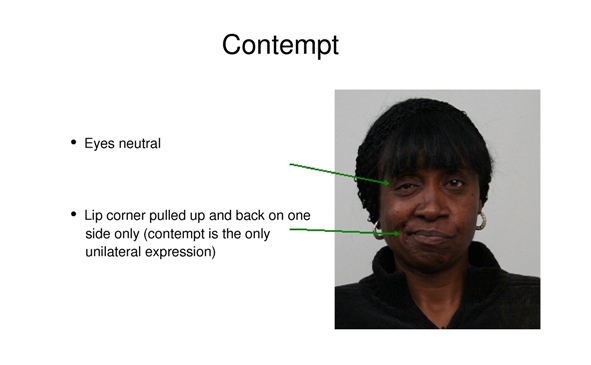 People often think that the terms “reading people” and “body language” are synonymous but that’s simply not true. In reality, being able to read body language or nonverbal behavior is just one (important) part of reading people.
People often think that the terms “reading people” and “body language” are synonymous but that’s simply not true. In reality, being able to read body language or nonverbal behavior is just one (important) part of reading people.
Of course reading people involves reading their body movements and facial expressions of emotion; we focus a lot on those skills here at Humintell. But reading people also includes aspects we may not necessarily think about such as the way someone dresses, the way someone speaks and even the way someone organizes their bedroom or office.
In fact, research has shown that a person’s home and office environment can reveal certain personality traits. According to University of Texas, Austin psychologist Samuel Gosling, Ph.D., and his colleagues, personal spaces such as bedrooms and offices are an incredibly rich source of information about people’s personalities. One of their studies called “A Room With a Cue: Personality Judgments Based on Offices and Bedrooms” was published in the Journal of Personality and Social Psychology.
A press release on EurekAlert describes the study.
”Gosling and Sei Jin Ko, of the University of Texas at Austin, Thomas Mannerelli, Ph.D., of the international business school INSEAD and Margaret Morris, Ph.D., of Sapient, a consulting firm in San Francisco found that people are remarkably accurate at guessing some aspects of others’ personalities–in particular whether they tend to be open and conscientious–based only on a look at either their offices or their bedrooms.
In two separate studies, Gosling asked people to rate others’ personalities–using the standard and quite broad “Big Five” traits of openness, conscientiousness, extroversion, agreeableness and emotional stability–after looking through either their offices or their bedrooms. He then compared how well these personality-raters agreed with each other as well as how accurate their assessments seemed when compared to self- and peer-ratings of the office and bedroom inhabitants.
The 94 offices examined in the study belonged to employees of five businesses: a bank, a real estate firm, a business school, an architecture firm and an advertising agency. The 83 bedrooms belonged to college students or recent college graduates living on or near a college campus. The researchers used several methods to ensure that the occupants did not make changes to their offices or bedrooms prior to the inspections. For example, one of the incentives for participating in the study was to receive an evaluation of how others perceive them based on their personal space.
Other researchers have done similar studies using photographs of people, video clips, evaluations of people’s reputations and the like. But Gosling is the first to try it without providing any direct visual or biographical information about the person whose personality is being assessed. Instead, they had to rely on cues such as personal items (though all photos and references to the occupants’ names were covered up), decorating style, neatness and level of organization.
Not only did Gosling find that personality raters–eight in the study looking at offices and seven in the study looking at bedrooms–agreed among themselves, but he also found that they were relatively accurate in their assessments. At least for certain traits. While earlier studies found that people could accurately assess extroversion and agreeableness by viewing photos and video clips but had a harder time assessing conscientiousness and openness, Gosling found the opposite is true for viewing people’s personal environments.
“Should you decide to date someone by looking at their bedroom?” says Gosling. “If openness is important to you, sure. But if extroversion is important, you might want to meet them first. It seems to depend on what information you want.”
By evaluating the cues in the offices and bedrooms that people use to assess personality traits, the authors found many cues that people could use to judge openness and conscientiousness–such as distinctive decorating for openness and neatness for conscientiousness–but few for judging the other traits. Gosling and his colleagues then determined which of these cues were “valid.” In other words, if a bedroom was neat, they looked to see whether the room’s occupant tended to be conscientious. If so, neatness was considered a valid cue for that room.
Based on their list of valid cues, the researchers found that people seemed to use valid cues to assess openness and conscientiousness but were less likely to do so to assess the other traits. The researchers also found that people relied on gender and racial stereotypes–based on their guesses of occupants’ gender and race–when few cues were available. So, for example, they tended to use stereotypes to assess emotional stability but not to assess conscientiousness.
“Even though the observers in both studies used stereotypes to form impressions,” said the researchers, “they did not base their judgments solely on stereotypes but may have drawn more heavily on the physical cues in the rooms.”
The researchers’ next step will be to better understand the process by which people make their personality evaluations. For example, in one study they’re manipulating people’s assessment of a person’s race to see if that affects their personality judgments.”
Want to learn more about this hugely complex but entirely fascinating topic?
Don’t miss a rare opportunity to learn from Dr. David Matsumoto in this first-time series, powered by Humintell science!
Learn more here!
 Guest blog by Craig James Baxter of
Guest blog by Craig James Baxter of 
 What about contempt?
What about contempt?